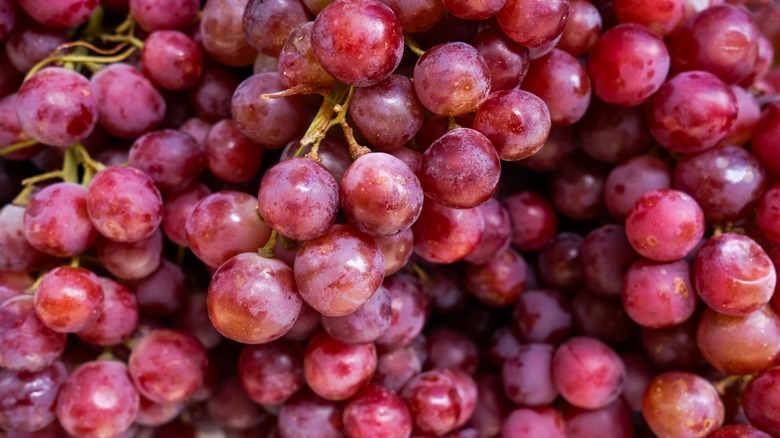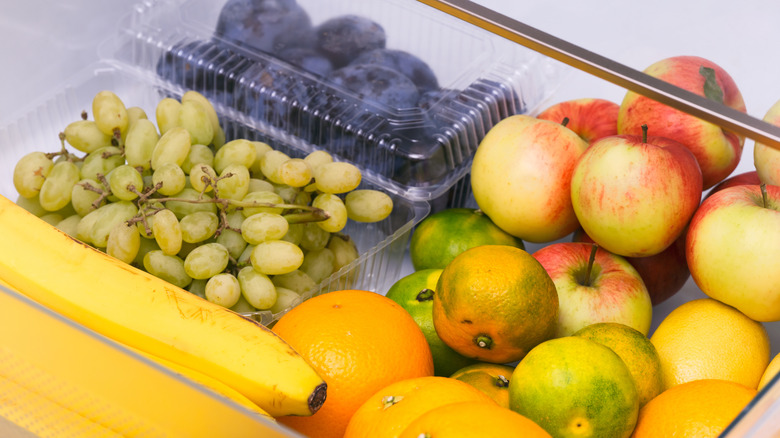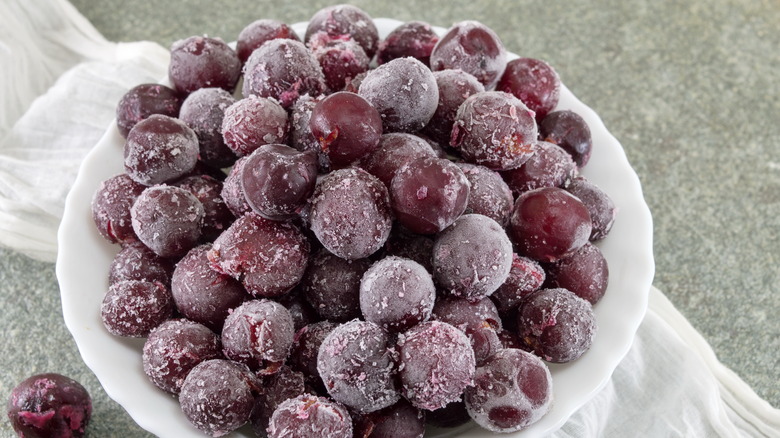How To Store Grapes So They Last For Weeks
Grapes are a universally loved fruit. Their sweet and slightly tart flavor are a delight when added to a salad recipe or smoothie, or enjoyed on their own as a simple snack. But this sometimes-pricey fruit is quite vulnerable to spoilage, and won't last long if kept at room temperature. So, if you have a big batch you'd like to use over a long period, you must store them properly to avoid wastage. The secret to ensuring they last for weeks is refrigeration.
Many cooking pros recommend refrigerating grapes without washing them (to prevent excessive moisture that can lead to fast spoilage) and then keeping those tiny globes in the perforated bag or container they were bought in before popping them in the fridge. This refrigeration method is good, however, it will keep your grapes fresh for up to two weeks only. If you want your produce to last even longer, you'll want to start with a vinegar bath.
First, cut the grape vines into small clusters. Place them in a large bowl of water mixed with ¼ cup of white distilled vinegar, gently agitate the fruits to wash them, and leave them to soak for a couple of minutes. Drain and rinse the produce, and dry them thoroughly before transferring them into an airtight glass jar lined with a paper towel at the bottom. Finally, place the jar in the fridge. This way, the grapes can last for at least three weeks — and sometimes even up to even six weeks.
Why this grape refrigeration method works so well
Behind every successful kitchen habit, there's often a scientific explanation, and the same is true for this refrigeration method that preserves grapes for weeks. First, soaking the fruits in a vinegar bath is the biggest step because the acidity in the vinegar prevents mold growth and kills any bacteria that may be present on the surface of the fruits. Because of that, it prevents (or at least slows down) the rotting of the grapes. Additionally, vinegar washes off that white stuff on your grapes called bloom (which is safe to eat but not everyone's preference) and therefore helps with a thorough cleaning.
The step of completely drying the fruits is important to reduce moisture on the surface. Too much moisture can lead to sogginess which creates a conducive environment for rot development. So ensuring the produce is bone dry before putting it in the fridge is necessary. Additionally, placing the grapes in an airtight container helps prevent potential cross-contamination while your grapes sit in the fridge for weeks. It also prevents the grapes from picking up strange odors from other fridge contents like onions, cut garlic, or fish.
Freeze grapes for even longer preservation
If you wish to keep your grapes for even longer, freezing them is the way to go. As the U.S. Department of Agriculture notes, freezing enables food to stay safe indefinitely: "If it's frozen, it's safe to use. Dates on frozen food are not for safety." Your grapes won't be dangerous to eat as long as they're kept frozen at 0 degrees Fahrenheit or below, though their quality will decrease over time. For the sake of best quality, it's best to consume them within about 12 months.
The downside with freezing grapes is that once thawed, the fruits lose their crispy texture and become too soft and mushy, and the taste is slightly altered. But if you plan to use them in a frozen state — for example, for blending them into smoothies or snacking on them as is — then freezing is perfect.
The process of freezing grapes is straightforward and quite similar to how you freeze most other fruits like watermelon. First, pluck the fruits from the stems, wash them under clean running water, then dry them thoroughly with paper or kitchen towels. Next, lay the grapes on a lined baking sheet and place them in the freezer to flash-freeze them for a couple of hours or overnight. Once they're frozen solid, transfer into zip-lock bags and remove air from inside before sealing and returning them to the freezer.


